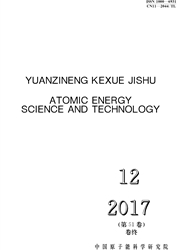

 中文摘要:
中文摘要:
通过堆外探测器的读数反演堆芯内的通量分布情况,通常需了解堆芯内各部分对探测器的贡献度。本文介绍了一种新方法来研究堆芯内各部分对探测器的贡献情况,通过编写蒙特卡罗程序实现中子输运模拟过程中记录中子的产生位置和反应位置,从而在进行探测器响应模拟时记录探测器吸收的中子的来源分布情况,得到堆芯内各处对探测器计数的贡献度。研究结果表明,探测器吸收的中子主要来自靠近探测器的3层组件,因此这3层组件中的通量对堆外探测器的计数影响最大。最外层组件、次外层组件和第3层组件对探测器的贡献度分别约为77%、20%、3%,该结果受通量分布影响较小,说明空间效应在各组件对探测器的贡献度问题中占主要作用。
 英文摘要:
英文摘要:
It is necessary to know the contribution of each assembly when the in-core flux distribution based on the response of the ex-core detector is sdudied. A new method to study the contribution of each part in core to ex-core detector was introduced in this paper. The producing and reacting position of neutron in simulation neutron transportation was documented through writing Monte Carlo code, the distribution of the source of neutron received by detector in the process of simulating detector response was recorded, and the contribution of each part in core to detector was gained. The research result shows that neutron received by detector is mainly from three assemblies. The flux of these three assemblies has the greatest influence on ex-core detector counting. The contributions of outmost assembly, second assembly and third assembly are about 77%, 20% and 3%, respectively. Flux distribution has little effect on this result and it demonstrates that the spatial effect has an important influence on contribution of the detector.
 同期刊论文项目
同期刊论文项目
 同项目期刊论文
同项目期刊论文
 期刊信息
期刊信息
